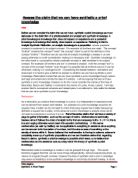Assess Rationalism. In this essay I intend to seek the true values of Rationalism through analysing its key concepts.
Assess Rationalism
In this essay I intend to seek the true values of Rationalism through analysing its key concepts.
Rationalism is the view that the ultimate source of knowledge is reason as only reason can guarantee the certainty required for true knowledge. This is opposed to Empiricism whereby Empiricists believe that experience and season is the root of knowledge. Rationalists use mathematics as a foundation to their theory. Mathematical knowledge can be acquired with the use of reason alone and without the use of senses. Rationalists claim that if one were to sit in a room alone, excluded from the world, one would be able to work out certain truths about geometry and numbers, simply by thinking hard. Thus, the knowledge gained seems to be eternal. Additionally, mathematical knowledge has a definite certainty which other forms of knowledge do not. For example, 3 x 3 is 9. This knowledge is certain and logical but more so, will be the same eternally. Therefore, Rationalists thought that the model of mathematical knowledge should be applied to all human knowledge.
A primary concept within Rationalism is that of innate ideas; ideas that we are born with and are not obtained by experience. Rationalists argue that some, but not all, ideas come from within and cannot be formed from human experience. A prime example of this is the idea God. Descartes believed that the idea of God was planted in our minds by God himself. He argued that God is perfect in every way and that nothing we experience is ever perfect. Thus, to have the idea of God, we cannot have produced it (through experience); it must have been an innate idea. (Though this comes from Descartes Trademark Argument, primarily as a theory for God’s existence, it also arguably justifies innate ideas).

This is a preview of the whole essay
Teacher Reviews
Here's what a teacher thought of this essay
3/5 The essay is very clear, but for a few errors which make the meaning of the sentences difficult or impossible to discern. Most of the descriptions of the positions of different thinkers are pretty accurate, though not without error. There are a couple of attempts at assessment, though very few. Given the task set, all the accurate description of rationalism cannot make up for this. This has the form of a good essay, but not for this question.








